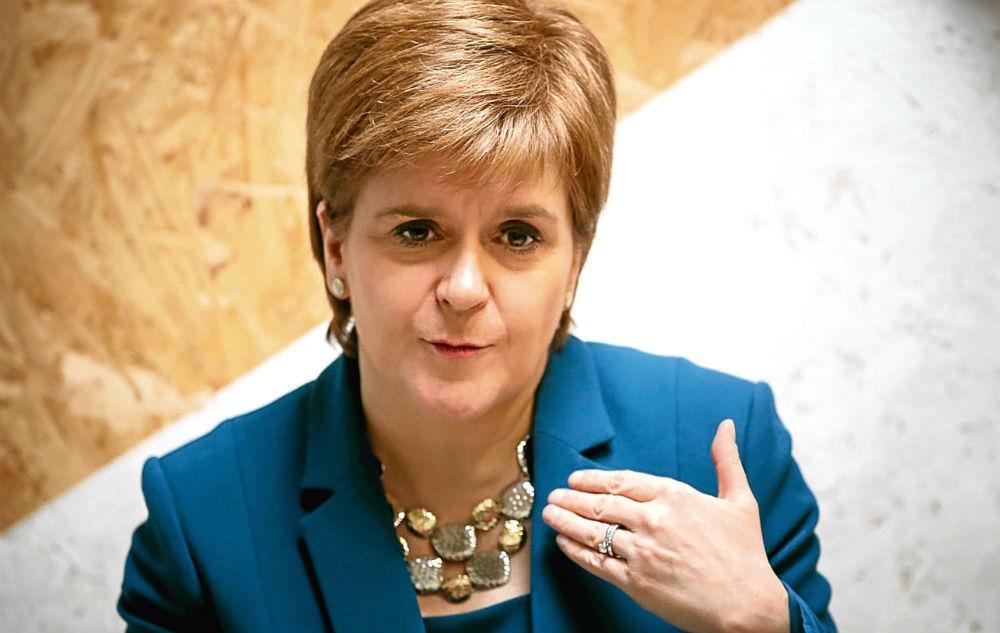POLITICS dominated the discussion between First Minister Nicola Sturgeon and award-winning Scottish sports journalist Graham Spiers during ‘In Conversation with… Nicola Sturgeon’ at the Edinburgh Festival Fringe.

Though the event was sold as a discussion of “politics, gender balance, favourite books and (maybe) eighties pop music”, it won’t come as much of a surprise that most of the hour was devoted to politics.
In particular, Boris as Prime Minister, Brexit, and Scottish Independence.
Spiers dove straight in by asking her what she thought of “her new chum” Boris Johnson’s appointment as Prime Minister. She kept her response light, saying that although she thinks he “talks a lot of nonsense” and that she’d rather he wasn’t Prime Minister, after her interactions with Theresa May, she said: “being able to have a conversation, however crazy that conversation may be, could be interpreted as a step in the right direction”.
Speirs then raised the big political news of the day: Jeremy Corbyn’s suggestion of a vote of no confidence, which, if successful, could result in the formation of a caretaker government to trigger a general election and seek an extension to Article 50.
The First Minister said that Corbyn’s suggestion is “one way of potentially avoiding a no deal Brexit” but “it’s not the only one”.
“My view is that the complications and implications of a no deal Brexit are so severe that we should be exploring all options, and we shouldn’t be ruling anything out.”
However, when Speirs asked if she was actively working with Corbyn on this as it would strengthen the likelihood of Scottish independence, she said, “If you’re asking me are we working away doing a deal at the moment the answer is no.”
However, she does believe that his refusal to block a second Scottish independence referendum if there’s the mandate for it is “the fundamentally democratic position”.
They then discussed what a no deal Brexit would mean for the Scottish independence movement.
The First Minister said: “The urgency of Scotland being independent in that scenario grows,” admits Sturgeon, but she’d rather have it “without the catastrophe of a no deal Brexit”.
“There’s going to be a lot of pain for a long time, which is why it’s so important to stop it.”
Sturgeon went on to speak about her influences. Growing up in the 80’s, Sturgeon lived through the fear of unemployment and redundancy caused by Margret Thatcher’s economic policies which is part of what inspired her to become a politician.
After some probing by Speirs she admits that though she disagrees with Thatcher’s policies, “by virtue of being Prime Minister she made a crack in the glass ceiling” for other women to envisage being in similar high-power positions.
She then touched on the fact that although she’s been “a party political animal” since she was sixteen years-old, she is uncomfortable with the tribalism and polarisation of modern politics.
She believes that we should all make more of an effort to find the “kernel of common ground” with people that we fundamentally disagree with.
During the Q&A portion of the evening, Sturgeon was asked about a variety of subjects, from delays in the reform of the gender recognition act to her recent appearance on Loose Women.
She was also asked about what, if anything, can be done to tackle the resurgence in sectarianism in football.
Sturgeon responded by saying she believes it can be fixed and she “will never accept a council of despair” on the matter.
“The clubs have to take principal responsibility for what happens in their own stadiums.”
“If the clubs can’t step up… then government has to step in.”
However, talk predictably returned to independence. When asked about the timing of a second independence referendum, Sturgeon made it clear that despite being very keen to move forward, it’s important that Scotland has the time to have an informed debate to avoid a similar mess to Brexit.
She also stressed how important it is that the process be recognised as legitimate, not just in the UK but in the international community, so that Scotland can “take its place amongst the community of independent nations.”
